

Creación de Actividades y Juegos.
A Dyslexic Child in the Classroom – Dyslexia the Gift. A dyslexic child who finds the acquisition of these literacy skills difficult can also suffer a lot of anguish and trauma when they may feel mentally abused by their peers within the school environment, because they have a learning difficulty.
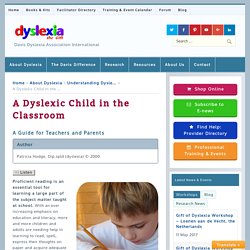
Much can be done to alleviate this by integrating the child into the class environment (which is predominantly a learning environment) where he/she can feel comfortable and develop confidence and self esteem. Class teachers may be particularly confused by the student whose consistent underachievement seems due to what may look like carelessness or lack of effort. These children can be made to feel very different from their peers simply because they may be unable to follow simple instructions, which for others seem easy. A Task-based approach. This article also links to the following activity.Try - Speaking activities - Task-based speaking - planning a night out Present Practice ProduceThe problems with PPPA Task-based approachThe advantages of TBLConclusion Present Practice Produce (PPP) During an initial teacher training course, most teachers become familiar with the PPP paradigm.
A PPP lesson would proceed in the following manner. First, the teacher presents an item of language in a clear context to get across its meaning. My current understanding of how grammar is mastered – the ‘theory’ This is the first post in series of two posts in which I review my current understanding of how grammar is mastered.
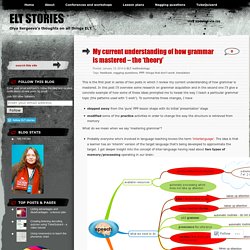
In this post I’ll overview some research on grammar acquisition and in the second one I’ll give a concrete example of how some of these ideas prompted me to tweak the way I teach a particular grammar topic (the patterns used with ‘I wish’). To summarize these changes, I have stepped away from the ‘pure’ PPP lesson shape with its initial ‘presentation’ stagemodified some of the practice activities in order to change the way the structure is retrieved from memory. “Grammaring”: The Fifth Skill In Language Teaching and Learning. Fez – Language teaching and learning has always been a controversial area within applied linguistics.
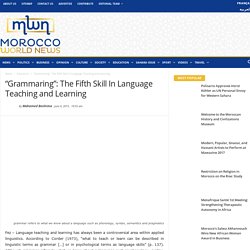
According to Corder (1973), “what to teach or learn can be described in linguistic terms as grammar […] or in psychological terms as language skills” (p. 137). Although grammar refers to what we know about a language such as phonology, syntax, semantics and pragmatics, language skills are about what we do with language. This includes listening, speaking, reading, and writing. Nine ways to revise English vocabulary using slips of paper. What can teachers do when classroom technology stops working?
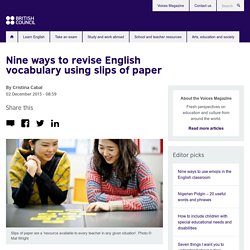
Cristina Cabal, latest winner of the British Council's TeachingEnglish blog award for her post on pronunciation, suggests nine activities for revising English vocabulary using simple slips of paper. Nowadays, it seems very simple to plan a lesson that makes use of the many tools available online, especially as more and more of us have access to the Internet in our classrooms.
But while technology is increasingly part of our teaching, there are times when it can cause problems and frustrations for teachers, such as when the Wi-Fi stops working or the computer shuts down, leaving you with a one-hour lesson to teach and no plan B up your sleeve. Checking Understanding. Analysis of the language consists of two sub-stages, often known as highlighting and concept checking.
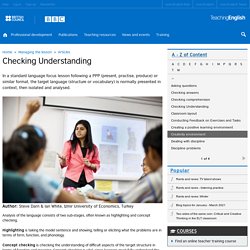
Highlighting is taking the model sentence and showing, telling or eliciting what the problems are in terms of form, function, and phonology. Concept checking is checking the understanding of difficult aspects of the target structure in terms of function and meaning. Concept checking is vital, since learners must fully understand the structure before any intensive practice of form and phonology is carried out. Bloom's taxonomy and English language learners. Thinking Skills and English language learners English language learners should be asked critical thinking questions from all levels of Bloom's Taxonomy.
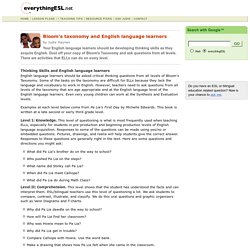
Some of the tasks on the taxonomy are difficult for ELLs because they lack the language and vocabulary to work in English. However, teachers need to ask questions from all levels of the taxonomy that are age appropriate and at the English language level of the English language learners. Even very young children can work at the Synthesis and Evaluation levels. Examples at each level below come from Pa Lia's First Day by Michelle Edwards. Level 1: Knowledge. Methodologies and Approaches in ELT. The short URL for this page is: The 20th century was a period of great experimentation and innovation in language education.
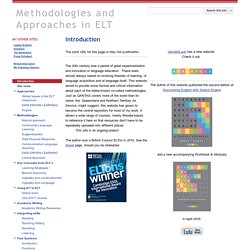
These were almost always based on evolving theories of learning, of language acquisition and of language itself. This website aimed to provide some factual and critical information about each of the better-known so-called methodologies. Just as QANTAS covers more of the world than its name, the Queensland and Northern Territory Air Service, might suggest, this website has grown to become the central repository for most of my work. It allows a wide range of courses, mainly Moodle-based, to reference it here so that resources don't have to be repeatedly uploaded into different places. This site is an ongoing project. The author won a British Council ELTon in 2010. Check it out. For the Teachers – Silent Cacophony. Welcome to Teaching Tip Tuesdays – The Table of Contents Please visit this page often as I will continue to update it every week with my latest teaching tip.
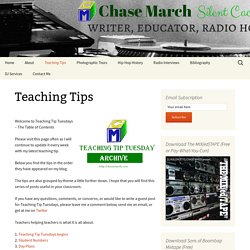
Below you find the tips in the order they have appeared on my blog. The tips are also grouped by theme a little further down. I hope that you will find this series of posts useful in your classroom. If you have any questions, comments, or concerns, or would like to write a guest post for Teaching Tip Tuesdays, please leave me a comment below, send me an email, or get at me on Twitter Teachers helping teachers is what it is all about. 1.
Posts by Theme will continue to be updated as well April Fools Day April Fools Day Art 5 Shading Techniques , Super Buck , Colour Wheel , First Day Craft , Don’t Throw That Out , Colour Families , Elementary Oragami (guest post) , Super Doors , Art Attack , Unscramble, Write, and Draw , Define Yourself: Word Collage , Visual (Drawing) Telephone , OK Go Primary Colours. American English. Recycling Language in a Dogme Classroom – chiasuanchong. I have often have teachers asking me, ‘If language just emerges, how do you ensure learning takes place?
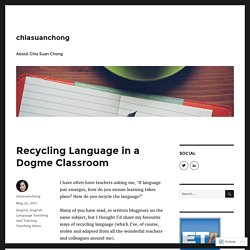
How do you recycle the langauge?’ Digital Publications for the Digital Classroom. Scott Thornbury's blog. Procedural knowledge vs. declarative knowledge. Procedural knowledge is, in a nutshell, knowing how to do something.
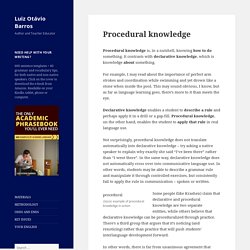
It contrasts with declarative knowledge, which is knowledge about something. For example, I may read about the importance of perfect arm strokes and coordination while swimming and yet drown like a stone when inside the pool. This may sound obvious, I know, but as far as language learning goes, there’s more to it than meets the eye. Declarative knowledge enables a student to describe a rule and perhaps apply it in a drill or a gap-fill. Procedural knowledge, on the other hand, enables the student to apply that rule in real language use. A dogme lesson with Luke Meddings at Exeter.
Webinar Archive. British Council. K-12 Education Tips & Strategies That Work. 19 Successful Online English Teachers Share Their Tips and Resources for Planning Online Lessons. Thanks to everyone who contributed! I receive A LOT of emails from online teachers (and online teachers to be) about planning; namely, what they should include in their lessons and what resources they should use. As there are many areas of English and different teaching methods, there is no one-size-fits-all solution.
What I do and what I use might not work for you and your learners. However, there are some common practices and amazing resources that you can use in your online lessons. And as a way of celebrating the incredible teachers who create their own content so that we can use it with our students, I have put together this super post: I asked 19 online teachers for a tip or an app when it comes to lesson planning, and for them to share their resource. (At the bottom of the post there is a chance for you to add your own resources.) Gabby Wallace Make sure that each lesson has a clear takeaway. WHAT’S YOUR RESOURCE? Kieran Docherty WHAT’S YOUR RESOURCE? Mau Buchler Sylvia Guinan Drew Badger. ESL Teacher Burnout: Here's How to Avoid It -